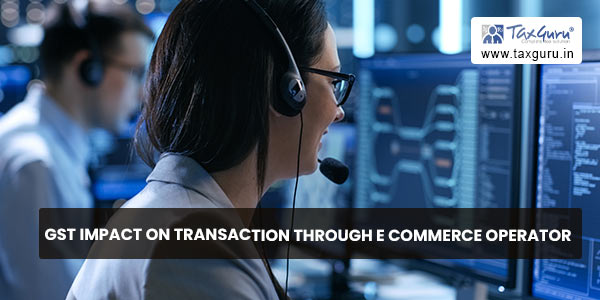GST impact on transaction through E commerce Operator
Aatma Nirbhar Bharat is the vision of the Prime Minister of making India a self-reliant nation which has given boost to many of start-ups and thereby transaction through E commerce operator has also increase. We will understand in this article impact of GST on transaction through e-commerce operator.
Points we will be focusing on:
1. What is e-commerce and e-commerce operator
2. Registration
3. Payment of GST to Government
4. TCS
5. Returns under GST
6. Income of E-commerce operator i.e. Commission
7. Parties involved in this transaction and how this transaction takes place
8. Practical Example
- Definition:
As per Section 2(44) of GST Act, 2017 E-commerce means supply of goods or services or both through electronic means.
As per Section 2(45) of GST Act, 2017 Electronic Commerce Operator (ECO) is the person who own, manages, operates or manage electronic commerce platform.
- Registration:
Compulsory every e-commerce operator has to take GST registration as per section 24(x) of GST Act. There is no threshold limit for them.
Suppliers also need to take compulsory registration under 24(ix), other than supplies specified in 9(5). Person supplying services can take benefit of threshold limit.
- Payment of GST to Government:
Supplier will only pay GST to the government. ECO in case of supply of services specified under section 9(5) will be require to pay GST to government
- Tax Collected at Source (TCS) under Section 52:
Every ECO is required to deduct TCS @1% (CGST 0.5% and SGST 0.5%) on net value of taxable supply which is collected by the operator.

Meaning of ‘Net value of taxable supplies’ – The expression “net value of taxable supplies” shall mean the aggregate value of taxable supplies of goods & services (other than services notified under section 9(5) of CGST Act,) made during any month by all registered taxable persons through the operator reduced by the aggregate value of taxable supplies returned to the suppliers during the said month – Explanation to section 52(1) of CGST Act.
This means that if ECO supplies exempt or zero rated supplies then no requirement to deduct TCS.
TCS is to be deposited by 10th of the succeeding month to the government.
Such deducted TCS will be shown in GSTR 2 of the supplier which he can use to take ITC.
When the supplier supply own products only through E commerce operator then no TCS is required to be collected.
- Returns under GST:
ECO is required to file GSTR1 and GSTR-3b along with GSTR 8 which need to file on 10th of succeeding month. GSTR 8 contains statement of TCS collected from supplier.
- Commission:
ECO will charge commission as its income on the supplies made through it by the supplier and on which GST will be attracted that ECO will collect from the supplier.
- Parties Involved: There are 3 parties involved in transaction through E-commerce Operator i.e.
1. Buyer (say, X)
2. E-commerce operator (say, Amazon)
3. Supplier (say, Y)
- Practical example:
X (Buyer) will look online what product he wants on Amazon, he will place order on Amazon and in return Amazon will place order to Y (Supplier). Y will directly supply to X for which X will make payment to Amazon. Suppose X purchases of Rs.500 then GST charged say 9% total amount collected from buyer 545/- (Rs 500 + GST) which he will pay to Amazon. Amazon will pay after deducting TCS of 1%, his commission say 10% on value of supply, also he will charge GST on such commission which will be 18% as it is supply of service.
So, net payment to supplier will be:
| Net value of supplies | 500 |
| GST charged @9% | 45 |
| Total Amount received by Amazon From Buyer | 545 |
| Deduct :TCS@1% | 5 |
| Deduct: Commission @10% | 50 |
| Deduct: GST on Commission @18% | 9 |
| Total amount Received by the Supplier | 481 |
Net tax to be paid by supplier to government (Output tax less ITC)
| Output tax on product sold which is collected from the buyer | 45 |
| Less: ITC of GST on Commission | 9 |
| Less : TCS | 5 |
| Total GST to be paid | 31* |
*Supplier can also take ITC of GST paid on purchase of that product or in case if he has manufacture then GST paid on inputs.
Conclusion: This article try to give basic understanding of ECO and GST impact on transaction through ECO.





Keep it up
Simple explained
Thanks
Fantastic article
I am proud of you 😊